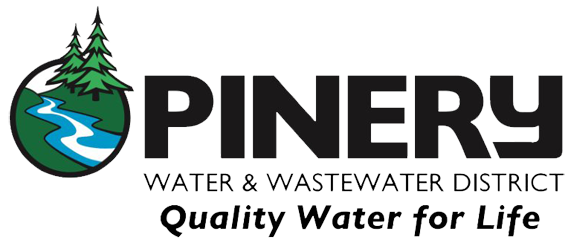Our goal is to provide you with a safe and reliable supply of drinking water. The Pinery’s water quality reports or “consumer confidence reports” are produced annually to describe the overall quality of water from its raw collection and storage to the treated reliable source at your tap.
Consumer Confidence Report
The 2025 Consumer Confidence Report is availabile!
Water Softener
How “Hard” is my water? What is Hardness?
Hardness in drinking water is caused primarily by the presence of two minerals; calcium and magnesium. “Soft” water on the other hand has very little amounts of these minerals. A good way to think about it is that making a lather or soapsuds is “hard” with hard water and making a good lather with soft water is easy.
Should you consider a home water treatment system?
This is a personal decision. These systems are not needed to make the water “safe”. In fact, if not properly maintained, the systems actually may cause water quality problems. However, some people do not like hard water. So if you decide to install a treatment system, think about where to install it inside your house. These systems can be installed on you faucet(s), under your sink, just on your hot water heater or at the point of entry into the house. A water softener can help eliminate hard water spots on your dishes and glasses. Most softeners are regenerated with salt. After the salt is used, it goes down the drain and into the environment. To prevent unnecessary regenerations, set your softener to regenerate after a selected amount of water has passed through it, rather then using a timer. This prevents wasting salt and water by regenerating too soon, producing a cost savings to you.
Should I buy a water softener?
The hardness of water varies with the District’s water sources. The choice to buy a softener is really a personal one since hard water is not harmful to your health. It is important to know that water softeners typically increase the sodium content of the water, a factor that should be considered by people on a low-sodium diet.
If you choose to install a softener, the District’s average “hardness” is 210 ppm (mg/L) or 11.5 grains per gallon. This information will be helpful in setting up your softener.
Discolored Water
A temporary milky or cloudy appearance is usually caused by air bubbles in the water, which poses no risk to your health. If the water is allowed to sit, the air will dissipate and the water will clear.
If the cloudiness does not disappear, please flush your plumbing at the highest spot in the house for five minutes. If the issue persists, please contact the District so that we may investigate.
What causes spots/film on my dishes/glasses? Spots or film on your dishes are typically caused by:
- Variances in water temperature
- Dish detergent
- Hard water
- Minerals that remain after the water has evaporated
Spots may be reduced through the use of a dishwasher rinse agent.
